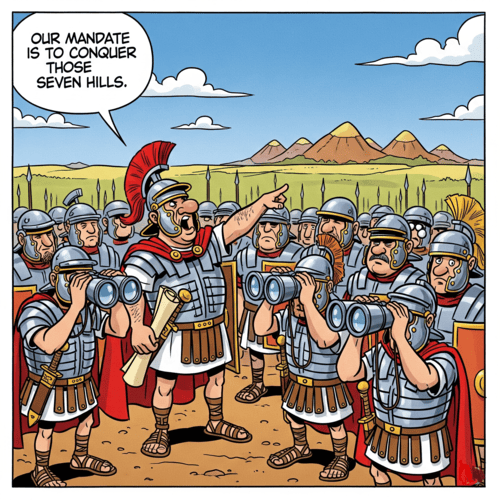What’s Wrong With Dominion Theology? A Biblical Critique
In some churches, a seductive teaching has gained momentum: Dominion Theology. Also known as the “Seven Mountains Mandate” or “Kingdom Now” theology, this movement claims Christians are called to take control of society’s key institutions—government, media, education, arts, business, family, and religion—to establish God’s kingdom on earth. While this sounds inspiring to believers who want to see Christ honoured in every sphere, Dominion Theology fundamentally misinterprets Scripture regarding the nature of Christ’s kingdom and the church’s mission.
DOMINION THEOLOGY IS ALSO CALLED THE ‘SEVEN MOUNTAIN MANDATE’
The term comes from a 1975 vision claimed by Bill Bright and Loren Cunningham, who said God showed them seven spheres of influence that shape culture: religion, family, education, government, media, arts/entertainment, and business. Proponents believe Christians must “take dominion” over these seven “mountains” to transform society. However, this extra-biblical revelation lacks any scriptural foundation and contradicts the Bible’s teaching about how God’s kingdom advances.
A careful examination reveals three major biblical problems that should cause every Christian to reject this teaching.
PROBLEM #1: MISUNDERSTANDING THE NATURE OF CHRIST’S KINGDOM
Dominion Theology’s most serious error lies in conflating the spiritual kingdom of God with earthly political dominion. When Pontius Pilate questioned Jesus about His kingship, our Lord’s response was crystal clear: “My kingdom is not of this world. If my kingdom were of this world, my servants would have been fighting” (John 18:36). Jesus explicitly distinguished His spiritual kingdom from earthly political power.
Throughout His ministry, Jesus consistently rejected attempts to make Him an earthly king. When crowds tried to crown Him after the feeding of the five thousand, “Jesus, perceiving that they were about to come and take him by force to make him king, withdrew again to the mountain by himself” (John 6:15). This wasn’t a missed opportunity—it was faithful obedience to the Father’s plan.
God’s kingdom advances through transformed hearts, not political conquest. Jesus told the Pharisees “the kingdom of God is not coming in ways that can be observed… for behold, the kingdom of God is in the midst of you” (Luke 17:20-21). When His disciples argued about greatness, Jesus contrasted kingdom leadership with worldly dominion: “You know that the rulers of the Gentiles lord it over them, and their great ones exercise authority over them. It shall not be so among you” (Matthew 20:25-26).
The apostle Paul reinforced this spiritual understanding, declaring “the weapons of our warfare are not of the flesh but have divine power to destroy strongholds” (2 Corinthians 10:4). Our battle is spiritual, not political, and our weapons are prayer, Scripture, and the Gospel—not legislative power or cultural influence.
PROBLEM #2: DISTORTING THE GREAT COMMISSION AND CHURCH’S MISSION
Dominion theologians reinterpret the Great Commission as a mandate for cultural and political conquest, but this badly distorts Jesus’ actual words. When Christ declared, “All authority in heaven and on earth has been given to me. Therefore go and make disciples of all nations” (Matthew 28:18-19), He was asserting His own authority, not transferring political power to the church. The command is to “make disciples,” not to “take dominion.”
The Greek word “nations” (ethnos) refers to people groups, not political governments. The early church understood this clearly—they focused on evangelism and discipleship, not political takeover. When the apostles asked Jesus about restoring the kingdom to Israel, He redirected them from political concerns to Gospel witness: “It is not for you to know times or seasons that the Father has fixed by his own authority. But you will receive power when the Holy Spirit has come upon you, and you will be my witnesses” (Acts 1:7-8).
The book of Acts records explosive church growth through preaching Christ crucified and risen, not through political manoeuvring. Early Christians were known for their transformed lives, sacrificial love, and bold Gospel proclamation. Peter described believers as “sojourners and exiles” whose mission was to “keep your conduct among the Gentiles honourable” so that “they may see your good deeds and glorify God” (1 Peter 2:11-12). This is evangelistic witness, not political dominion.
Paul charged Timothy to “preach the word; be ready in season and out of season; reprove, rebuke, and exhort, with complete patience and teaching” (2 Timothy 4:2). The church’s primary calling is proclamation of God’s Word, not establishment of theocracy.
PROBLEM #3: IGNORING BIBLICAL ESCHATOLOGY AND TIMELINE
Perhaps most troubling, Dominion Theology assumes Christians will establish God’s kingdom before Christ’s return, directly contradicting biblical eschatology. Scripture presents a very different picture of the last days. Paul warned Timothy that “in the last days there will come times of difficulty. For people will be lovers of self… having the appearance of godliness, but denying its power” (2 Timothy 3:1-2, 5). This describes moral decline, not Christian dominion.
Jesus Himself predicted increasing opposition: “You will hear of wars and rumors of wars… For nation will rise against nation, and kingdom against kingdom… Then they will deliver you up to tribulation and put you to death, and you will be hated by all nations for my name’s sake” (Matthew 24:6-7, 9). The church is called to endure persecution, not eliminate it through political power.
Revelation reveals Christ establishes His kingdom at His return: “The kingdom of the world has become the kingdom of our Lord and of his Christ, and he shall reign forever and ever” (Revelation 11:15). Only Jesus Himself can establish perfect justice and righteousness. Our hope is His second coming, when “the Lord himself will descend from heaven” (1 Thessalonians 4:16).
THE BIBLICAL ALTERNATIVE: FAITHFUL PRESENCE
Rather than seeking dominion, Christians are called to faithful presence. We respect governing authorities while maintaining primary allegiance to Christ (Romans 13:1-7). Like the Jewish exiles in Babylon, we “seek the welfare of the city where I have sent you into exile, and pray to the Lord on its behalf” (Jeremiah 29:7). We serve as “salt and light” through Christian character and Gospel witness (Matthew 5:13-16), focusing on personal holiness, evangelism, and serving others rather than political conquest.
True Christian influence comes through Gospel transformation, not political dominion. Our King reigns from heaven, and His kingdom advances one converted heart at a time until He returns to establish His perfect rule forever.
WHAT’S WRONG WITH DOMINION THEOLOGY? RELATED FAQs
Why are Dominion Theology proponents often postmillennial?Postmillennialism teaches Christ will return after (post) a thousand-year golden age of Christian influence on earth. This eschatological view naturally aligns with Dominion Theology’s belief that Christians will gradually Christianise the world before the Lord’s return. However, most Reformed postmillennialists like Charles Hodge believed this would happen through Gospel preaching, not political conquest. Modern Dominion Theology distorts even postmillennial eschatology by emphasising cultural mandate over Gospel proclamation.
- What do the leading Reformed scholars say about Dominion Theology? Al Mohler has warned Dominion Theology “confuses the kingdom of God with human political structures” and represents a “fundamental confusion about the nature of the kingdom.” John MacArthur calls it a “false teaching” that “seeks to turn the church into a political institution.” RC Sproul criticised it for misunderstanding both the timing and nature of Christ’s kingdom. These scholars consistently emphasise that while Christians should engage culture, the church’s primary mission remains Gospel proclamation, not political dominion.
- How does Dominion Theology differ from regular Christian political engagement? Biblical Christian engagement involves faithful citizenship, voting according to conscience, and serving in government roles while maintaining clear distinctions between church and state. Dominion Theology, however, seeks to merge church and state, claiming Christians have a divine mandate to control secular institutions. It confuses temporal political goals with eternal spiritual realities, making political success a measure of faithfulness rather than Gospel fidelity.
- What about the “cultural mandate” in Genesis 1:28? Dominion theologians often cite God’s command to “subdue” and “have dominion” over creation as justification for political control. However, this passage refers to humanity’s role as stewards of the natural world, not political rulers over other humans. The Fall corrupted this mandate, and the Great Commission now takes precedence, calling Christians to make disciples rather than take dominion over political structures.
- How does Dominion Theology affect missions and evangelism? By redefining the Great Commission as cultural transformation rather than soul-winning, Dominion Theology can undermine traditional missionary work. Some adherents focus more on social justice initiatives and political activism than Gospel preaching and church planting. While good works have their place, the primary need of lost humanity is spiritual regeneration through faith in Christ, not improved political systems.
What’s the difference between Dominion Theology and Christian Reconstructionism? Christian Reconstructionism, associated with RJ Rushdoony, explicitly advocates implementing Old Testament civil law in modern society. Dominion Theology is broader and more subtle, focusing on gaining influence in key cultural spheres rather than specific legal changes. However, both movements share the fundamental error of expecting Christians to establish God’s kingdom through human effort before Christ’s return, rather than through Gospel witness while awaiting His second coming.
WHAT’S WRONG WITH DOMINION THEOLOGY? OUR RELATED POSTS
- The Negative Evidence Against Materialism: 5 Powerful Examples
- The Verification Principle: Why It Fails Even Before It Starts
- The Jesus Seminar Exposed: Distortions of the Real Christ
- Seventh Day Adventism: How Does It Differ From Biblical Doctrine?
- Is God Still Learning? Fatal Flaws in Process Theology Exposed
- Freemasonry’s Dark Secrets: A Biblical Analysis
- What is Open Theology? Why It Falls Short of Biblical Truth
Editor's Pick

What Makes a Godly Mom? A Scripture-Backed Guide
In our culture’s confusion about gender roles and parenting, the timeless question remains: what makes a godly mother? While secular [...]

Paul’s Mandate for Men: Headship Or Servant Leadership? Or Both?
Modern Christianity has fallen into a trap. We've created an either/or battle between "headship" and "servant leadership," as if these [...]

Should We Stop Using Male Pronouns for God? Why Do We Say No?
A friend of ours arrived eagerly at his first theology class in seminary. But he quickly discovered something troubling: the [...]

Did Old Testament Law Force Women to Marry their Rapists?
**Editor’s Note: This post is part of our series, ‘Satan’s Lies: Common Deceptions in the Church Today’… Viral misinformation abounds [...]

From Danvers To Nashville: Two Statements, One Biblical Vision
30 years separate the Danvers Statement on Biblical Manhood and Womanhood (1987) and the Nashville Statement on Human Sexuality (2017). [...]

The Nashville Statement: Why Affirm It Despite Media Backlash?
WHY DO REFORMED CHRISTIANS STAND BY THIS STATEMENT ON MARRIAGE AND GENDER? When the Nashville Statement was released in 2017, [...]

Who Is Belial? Solving The 2 Corinthians 6:15 Mystery
Belial: This name from the pages of Scripture chills the soul. Who is this mysterious figure Paul invokes in 2 [...]

Celibacy Or Castration: What Jesus Really Means in Matthew 19:12
One of Scripture's most shocking misinterpretations led theologian Origen to castrate himself in the third century. His tragic mistake? Taking [...]

Philippians 4:13: Did Paul Really Mean We Can Do ALL Things?
"I can do all things through Christ who strengthens me." It's on gym walls, graduation cards, and motivational posters everywhere. [...]

The Ordinary Means of Grace: Why Are They Indispensable?
ORDINARY MEANS FOR EXTRAORDINARY TRANSFORMATION What if God's most powerful work in believers' lives happens through the most ordinary activities? [...]
SUPPORT US:
Feel the Holy Spirit's gentle nudge to partner with us?
Donate Online:
Account Name: TRUTHS TO DIE FOR FOUNDATION
Account Number: 10243565459
Bank IFSC: IDFB0043391
Bank Name: IDFC FIRST BANK






